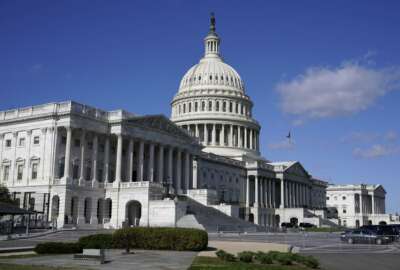
By all indications, FY ’21 is going to be a bumpy ride
Missing the guardrails by inches, the nation's careening political apparatus has managed to fund the government for fiscal 2021.
Best listening experience is on Chrome, Firefox or Safari. Subscribe to Federal Drive’s daily audio interviews on Apple Podcasts or PodcastOne.
Missing the guardrails by inches, the nation’s careening political apparatus has managed to fund the government for fiscal 2021. But as calendar ’21 approaches, there’s a lot of risk, because the government’s cybersecurity situation is in the danger zone. Only nine months remain to carry out this year’s program plans. For one view of how to proceed, Federal Drive with Tom Temin turned to the President and CEO of the Professional Services Council David Berteau.
Interview transcript:
Tom Temin: And David, this bill is not pretty. It’s full of pork and 6,000 or something pages long. But what’s your major takeaway from the services contractor standpoint?
David Berteau: Well, thanks, Tom, you’re right. At 5,500-plus pages, I have not read every word yet. And in some parts –
Tom Temin: You’re not the only one.
David Berteau: Yeah, including those who voted on it. But it is an important bill. It’s important legislation. And obviously, one of PSC’s top priorities every year is to get full-year appropriations passed, not only to avoid a government shutdown but all the negative impacts of a continuing resolution, especially if they’re only one day or two days long. Hard to write a contract for task, “Okay, you got one day, what are you going to do this day?” Right? So we saw a lot of good things that were important to contractors, in the COVID part of the bill, the extension of Section 3610, which is the the authority for the government to reimburse companies to keep people on the payroll when they can either work remotely or access the facility. That’s vital. It’s been extended through the end of March. And you know, with the pandemic still waging in a lot of places, this is really important to keep key personnel and skilled workers on the payroll as they’re needed. There’s some additional updates, you know, in the PPP loan program, a number of smaller companies, contractors have taken advantage of that. And there’s some emphasis on lending, particularly for smaller banks and financial institutions and minority-owned companies. A number of our members actually had a lot of trouble getting money, right, because the banks were a little tight. The big ones obviously do fine. But, and you’ve already seen, I think you reported on that Treasury Department program that led to virtually nothing available to anybody, including those who really needed it. So those are good things.
Tom Temin: Now, the issue, though, what about the government spending the money that it’s actually got?
David Berteau: Well, that’s the key point. And obviously, we’ve gotten the full year appropriations. So this is the fifth straight year that Congress rejected the president’s budget proposal, which proposed significant cuts in the spending of civilian agencies. Congress rejected it – fifth year in a row – and actually appropriated to the budget caps, which is not what the president proposed. But for the past four of those years, what we’ve seen is that the combination of the president’s budget proposal being low, and of course, the agencies have to comply with that proposal until there’s an appropriation that says they’ve got more. And when that appropriation is not until three, four, five, six, seven months into the fiscal year, you have the net effect of not obligating the funds that Congress appropriated. And we’ve seen that across the board year by year, sometimes as much as 10% below what you would have expected contract spending to be, and it’s not because the work isn’t there to be done, the work is there to be done, right? To the extent that Congress has decided that that work is important, and the agencies have budgeted and programmed for it. So one of the things we think the early actions that the Biden administration could take would be to encourage agencies to sort of take OMB’s thumb off the scale and encourage agencies to actually obligate the funds that Congress has appropriated. And one of the places most obvious there would be in modernizing legacy systems, because we’ve seen the results of the hacking now. Actually we haven’t seen results – we’ve seen the concerns over the hacking. We’re still trying to figure out what the results are.
Tom Temin: That’s right. I think agencies are trying to figure out if they were hacked in the first place, and it doesn’t look like the object of the attacks was to do damage but to place backdoor means of getting information out, so everything could be functioning normally and the effect – the attack will have no effect on operation of systems. But that doesn’t mean the data is not flowing out some backdoor and Lord knows where that could end up. I guess we’re speaking to David Berteau, CEO of the Professional Services Council. The modernization did not get the full funding that the administration wanted, though, the TMF itself in the –
David Berteau: Right, the TMF appropriators have never appropriated the full amount authorized, I think $25 million is all that’s in there. But they haven’t actually spent the funds that have been appropriated in prior years either. Which is, it’s always hard to argue for more money when you haven’t used the money you already have, right? And a lot of those roadblocks have been because the focus has been on the pilot programs that agencies have put forth and not all of them have been all that successful. But hidden inside that Modernizing Government Technology Act is a much more powerful tool that we’re encouraging, again, the new administration to take better advantage of, and that’s the creation of working capital funds inside agencies where you can literally finance monetization with the savings. You replenish the fund with the savings that come from getting rid of the legacy system. It requires two things: Number one is doing the modernization. Number two is getting rid of the legacy systems, which, frequently that may be actually harder than the modernizing itself, because somebody’s in love with every program that’s out there. This is a huge opportunity. And actually, you could be a great way to put those new FY21 funds to quick use, and have enormous benefits. Everybody agrees that the single greatest thing you can do for cybersecurity is to update your system. So they’re current, and they’ve got all the protections built in. And it’s time to do that across the whole federal government.
Tom Temin: I guess the sense is that since this is in many ways, the Biden administration is a revival of a Broadway show that ran for eight years under the Obama team, we should see a lot of the same people with a lot of the same ideas returning. It might be the stand ins now we’ll be in the main cast, but everyone will know what they’re supposed to do. That’s the sense I’m getting.
David Berteau: That sense has a basis in history, Tom. You know, it’s pretty rare that a party returns to power after only four years outside of power, right? For the Democrats, actually, the last time this happened was in the 19th Century. So the Democrats are way out of practice with a four-year hiatus in returning from that. For the Republicans, it was in fact Ronald Reagan coming in in 1980, after four years under Jimmy Carter. And what you saw in 1980, in the 1980 transition was a lot of people who had been in the Nixon-Ford administration, were now coming back in different positions in many cases. [Caspar] Weinberger, for instance, it’s not at – but at DoD. You’ll see a similar pattern here, because four years is not very long, eight years is a long time.
Tom Temin: And what’s your sense of the defense side of the budgeting?
David Berteau: Well, so Defense is the one agency that has obligated the funds that Congress has appropriated, and they’ve actually done a very good job. We don’t have final FY20 numbers yet for DoD but the preliminary numbers for the first three quarters indicates that DoD has been obligating funds commensurate with the increases in spending that they’ve gotten. Questions abound, though, about how that’s going to be accommodated under coronavirus restrictions that are still in place, right. And one of the things that we’re looking at is its impact on contractors for not only the section 3610, but vaccines. DoD has got 11 million vaccines, not very many of them are going to contractors, contractors are going to have to get those vaccines along with everybody else from the state allocations. And the big question is, are there critical infrastructure workers who should be in line for those when that starts and for that we need DoD to issue guidance.
Tom Temin: David Berteau is president and CEO of the Professional Services Council. It’s going to be a fun ride in the next few months. And we’ll hope you’ll be with us throughout all of this. We’ll post this interview at Federal News network.com/FederalDrive. Hear the Federal Drive on demand. Subscribe at Apple Podcasts or wherever you get your shows.
Copyright © 2024 Federal News Network. All rights reserved. This website is not intended for users located within the European Economic Area.
Tom Temin is host of the Federal Drive and has been providing insight on federal technology and management issues for more than 30 years.
Follow @tteminWFED
Related Stories





